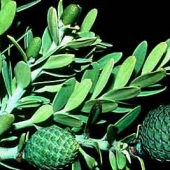Please select root levels for the menu
NZ Plants
Lepidothamnus laxifolius - pygmy pine, mountain rimu
Podocarp family: Podocarpaceae
-
Mature foliage
View picture -
Mature foliage, leaves with a keel
L Jensen
View picture -
Juvenile foliage
L Jensen
View picture -
Juvenile foliage
L Jensen
View picture -
Seed cones
L Jensen
View picture -
Seed cone
L Jensen
View picture
Lepidothamnus laxifolius us is a small shrub. Juvenile plants have needle-like leaves which gradually change into overlapping yellowish green scale-like leave with a prominent ridge (keel) on the lower (outer) surface. Small, fleshy ovule cones are formed. After fertilisation, an outgrowth of the epimatium forms a thin pinkish collar at the base of the seed while the bracts below form a bright fleshy receptacle. Formerly known as Dacrydium laxifolium.
An endemic species with a scattered distribution in the North Island but more common on the South Island’s west coast and Stewart Island.
A small genus with two species in New Zealand and one species in southern Argentina and Chile.
Vegetative characteristics |
Reproductive characteristics |
|---|---|
Adult plant form: prostrate scrambling shrub up to 1 m |
Pollen and ovule cones: on the same or separate plants |
Adult leaf form: scale-like, overlapping, distinct ridge (keel) on lower (outer) surface |
Pollen cone: 5-8 mm long |
Adult leaf size: 1-2 mm |
Ovule cone: one fertile scale and 2-3 sterile bracts |
Adult leaf arrangement: singly on stem, flattened (appressed) to stem |
Ovule position: solitary, on upper face of fertile cone scale |
Juvenile leaf form: linear, but not prickly |
Ovule coverings: an inner covering (integument); an outer covering (epimatium) restricted to basal portions of the ovule |
Juvenile leaf size: 5-12 mm |
Ovule pore (micropyle): hooked downward on an upright ovule |
Juvenile leaf arrangement: singly (spiral) and spreading away from the stem |
Mature seed cone: a single black seed with a slightly fleshy epimatium cupped around base of seed |
Stem(receptacle) below seed: fleshy, derived from basal bracts and adjacent leaves |




